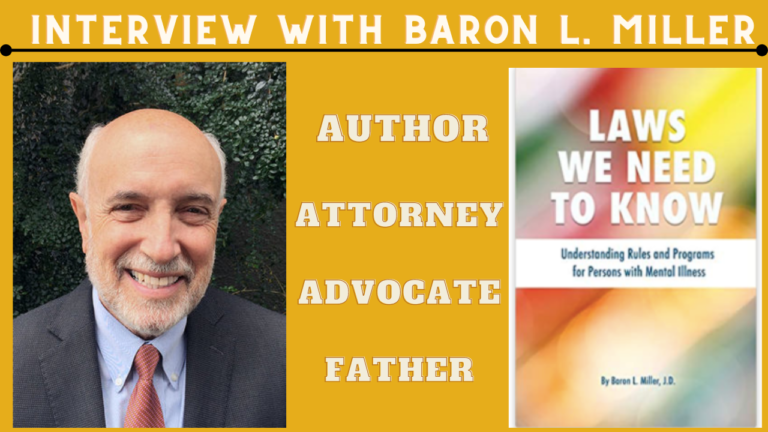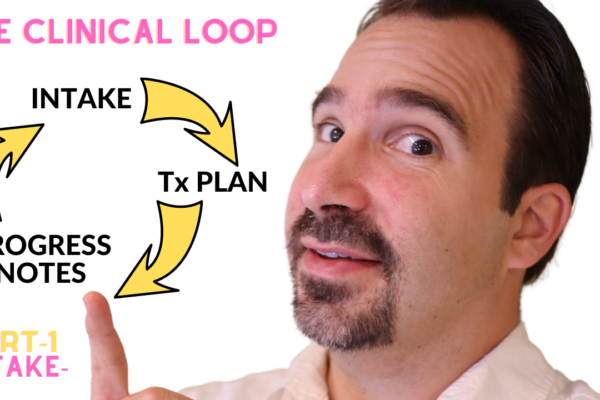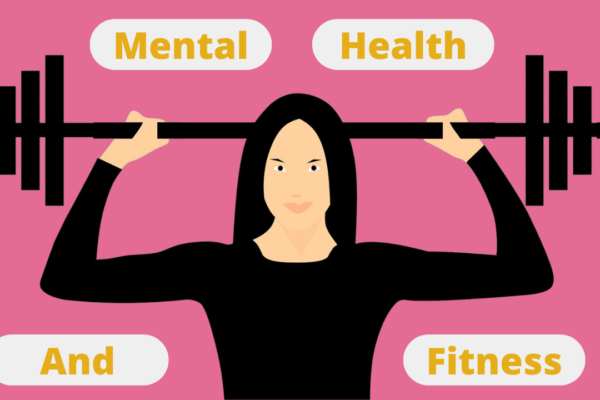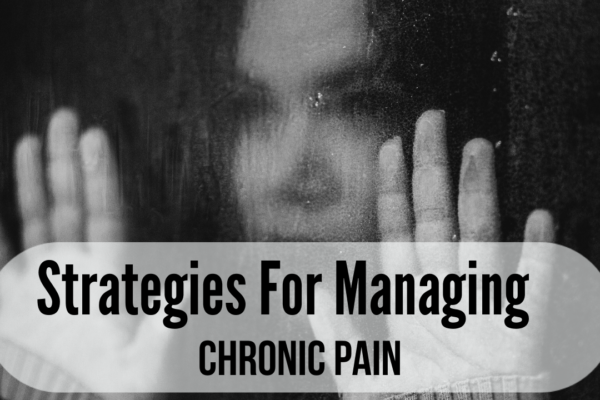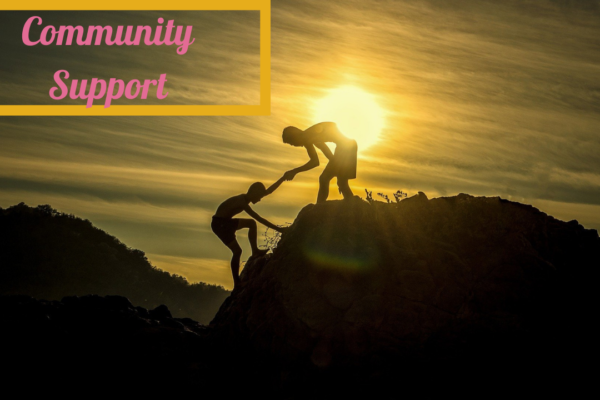Table of Contents
Interview with Baron L. Miller, Attorney at Law
Are legal issues getting in the way of caring for yourself or a loved one with mental illness?
Then stick around, because in this episode of the MHT, we are talking about Laws We Need To Know, with author and attorney at law, Baron Miller.
BIO: Baron L. Miller, Attorney at Law, Author Of Laws We Need To Know.
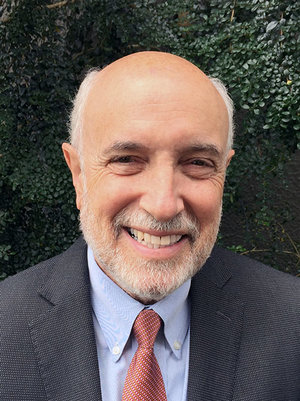
Baron L. Miller was born and raised in San Francisco, a second generation American, the grandchild of Jewish immigrants from eastern Europe. He attended public grade schools and college, and received his Juris Doctorate degree from San Francisco Law School in 1972. Since his admission to the Bar in 1973, Mr. Miller has continuously practiced law in San Francisco.
Mr. Miller harbors ideas for a better world, and has been involved in numerous social action movements. His mother was a caregiver and a designer, and his father was an attorney, and growing up he learned from them the value of acquiring knowledge and skills, and using them to benefit others as well as oneself. Through them he also learned commitment. There is a family focus on achievement in the law, as Mr. Miller’s sister, Lynn Miller Nightingale, is a respected independent probate paralegal preferred among San Francisco probate and estate planning attorneys, and her son, Zachary Miller Nightingale, is a prominent immigration attorney in San Francisco.
Mr. Miller is married to Nancy Keyes, a Nurse Practitioner at the Veterans Administration Medical Center in San Francisco, and an assistant clinical professor in the UCSF School of Nursing. Together they enjoy sports, literature, and the arts, both as participants and as spectators.
Mr. Miller has one child, an adult daughter, who suffers from a disabling chronic illness.
https://www.baronmillerlaw.com/profile
Learn More:
***Note: some of the links in this post include affiliate links for which I earn a commission when purchases are made using those links, at no additional cost to you.
GET THE Book: Laws We Need To Know: Understanding the rules and programs for persons with mental illness.

Visit His Website:
GET SOCIAL: Linkedin:
Transcript:
Speaker 1
Are legal issues getting in the way of caring for yourself or someone that you love with mental illness? Than stick around.
Speaker 1
Because in this episode of the mental Health Toolbox we’re talking all about mental health laws that you should know with author and attorney at law Baron Miller.
Speaker 1
So let’s go.
Speaker 1
Hello Thrivers and welcome back to the mental health toolbox. If you’re meeting me for the first time, my name is Patrick Martin and I am on a mission to help 1,000,000 people improve their quality of life with actionable tips on personal development. So let’s do it.
Speaker 1
Alright, hi Barron, thank you so much for making time today to be on the mental health Toolbox Video podcast.
Speaker 1
I appreciate you taking time out of your day.
Speaker 2
Well, I assure you it’s my pleasure.
Speaker 2
Patrick thank you.
Speaker 1
Thank you so you are not just an attorney at law. For 47 years I believe something like that, right?
Speaker 2
1973 is when it all started, yes.
Speaker 1
Fantastic, I’m sure you’re a wealth of information, but you recently published a book, right?
Speaker 2
I did.
Speaker 1
Laws we should know.
Speaker 2
It’s actually the title of it is laws.
Speaker 2
We need to know.
Speaker 2
Should I put it up on the screen?
Speaker 1
Yes please oh fantastic.
Speaker 2
Yeah, so this is what it looks like, and there’s a subheading on it which may or may not be readable, but it is understanding laws and programs for persons with mental illness.
Speaker 1
Fantastic, what, uh, what an awesome subject.
Speaker 1
The reason I asked you on today is because I, I think that is definitely one of those.
Speaker 1
More ambiguous areas that even people such as myself who have been in mental health as a practitioner for over a decade, really don’t know a whole lot about in terms of how to advise families.
Speaker 1
And that’s pretty much your niche right now, right is helping families with met, you know families of.
Speaker 1
Of loved ones with disabilities kind of navigate this legal system and the pitfalls and challenges that come with it.
Speaker 2
If that that’s a good way to describe it.
Speaker 2
It is my niche and has become my ditch and.
Speaker 2
That is what I am doing mostly in my law practice these days, although not exclusively, but it does take up most of my time and something I kind of.
Speaker 2
Morphed into.
Speaker 2
Probably what people these days would call organically that it was natural because of my own situation.
Speaker 1
Yeah, and I think that’s the best way to kind of get into the work that we do or the work we become known for is because of our passions.
Speaker 1
Uhm, you say because of your personal experience.
Speaker 1
Did you want to share a little bit about that?
Speaker 2
Sure, I have a 46 year old daughter who suffers from schizophrenia.
Speaker 2
And she was diagnosed and actually had her first full psychotic break in 1990. And at that point I started to learn about laws and rules, then programs.
Speaker 2
Related to those who suffer from mental illness, and I.
Speaker 2
Became somewhat of a involuntary expert, as as so many parents do, and.
Speaker 2
I I was learning things that I thought I might be able to help other people with and as I started to get involved with NAMI groups and such I started meeting other parents and friends and and people with mental illness and high functioning people.
Speaker 2
With mental illness, and I soon became, uh, uh.
Speaker 2
A go to person, so to speak, a resource for others in similar situations.
Speaker 2
And I these days I I.
Speaker 2
It’s rare that a day will go by, but I don’t get a call from somebody saying I.
Speaker 2
I got your name from somewhere and I just have this question and I’m wondering what I should do.
Speaker 2
So and I’m of course, I’m always happy to talk to people and and give them information and if they become clients then that’s great too.
Speaker 2
But I am available to to answer questions and.
Speaker 2
You know there’s no there’s no obligation.
Speaker 2
But by anyone to ask who asks, wants to ask a question and get information, but at some point, about five years ago, I think I I thought well, wouldn’t it be helpful if I were to write down what I know in some kind of logical?
Speaker 2
And have it exist as a written resource for people.
Speaker 2
And so I spent about five years writing and rewriting and editing, and came up with this book that came out last year and I believe it does it and.
Speaker 2
It even does it for me.
Speaker 2
There things were.
Speaker 2
I will refund things I’m not sure about.
Speaker 2
Refer to the to the book and see.
Speaker 2
Oh yeah, now I remember that’s the role on that.
Speaker 1
How fantastic to have a.
Speaker 1
Concentrated guide I you know, I think that’s one of the wonderful things about books in general. You’re taking somebody’s life long experience, right expertise and boiling it down into something digestible and quickened and referenceable and and.
Speaker 1
I mean, a lot of people, they’ll just.
Speaker 1
Throw together an ebook or.
Speaker 1
FAQ Yu Yu.
Speaker 1
Took you know your time right your precious time and you you put together this magnificent compilation of.
Speaker 1
Your experience and and a guidebook around these issues?
Speaker 1
I’m wondering where they’re repeat certain.
Speaker 1
There must have been some kind of repetition around the questions that you’re running into that you felt you know this is a need.
Speaker 1
This is a real need because you’re probably hearing the same questions over and.
Speaker 2
Over again right exactly?
Speaker 2
Yeah, yeah.
Speaker 2
So I mean there are.
Speaker 2
There are questions that.
Speaker 2
Everybody has, regardless of their situation, and they of course.
Speaker 2
Hopefully they’re covered in the book and then there are more specific things and for example.
Speaker 2
I mean, there’s.
Speaker 2
A chapter in the book on a criminal procedure because.
Speaker 2
I mean not infrequently.
Speaker 2
The people who have.
Speaker 2
Mental health issues find themselves charged with a crime and so.
Speaker 2
And this is can be a real horror because it’s well for various reasons, but it can be a big.
Speaker 2
Confusing situation for the person charged with the crime.
Speaker 2
And for those who.
Speaker 2
Who want to help?
Speaker 2
Want to help him?
Speaker 2
Or her and.
Speaker 2
May or may not be allowed to help him or her, but.
Speaker 2
I thought it would be a good idea to lay out the criminal.
Speaker 2
Procedure process from start to finish and so people would know what to expect and.
Speaker 2
And would understand some of the process that’s going on while it’s going on.
Speaker 2
So not everybody.
Speaker 2
Hopefully people, not everybody, is going to be facing criminal charges and hopefully most people won’t.
Speaker 2
But for those who do, it’s there.
Speaker 1
How fantastic.
Speaker 1
I mean coming?
Speaker 1
I have a background in some forensic soul short and the mental health system I toured patent hospital here in California.
Speaker 1
For those who are, have you know mental deficits who commit crimes obviously weren’t able to stand trial, and that kind of thing we have clients coming to, you know, have clients come to me after the gabapentin?
Speaker 1
You know on parole and that kind of thing, and through you know transitioning you know off parole and referred to mental health.
Speaker 1
And maybe one.
Speaker 1
09 and then that whole world, you know of forensic mental health is it’s.
Speaker 1
Entered, you know, it’s fascinating for those on the outside, but for those who are being directly affected by it, who are in the mix of it, the families must be terrifying.
Speaker 1
And anytime there’s an unknown factor, uhm, it’s scary, right?
Speaker 1
But especially when you’re your loved ones on the line, I can imagine.
Speaker 2
Right, so yeah, I, I think you’ve.
Speaker 2
Explained it very well.
Speaker 2
That’s the situation there’s.
Speaker 1
Oh, what a beacon of light that would be for someone who doesn’t know what to expect, or at least understand.
Speaker 2
A lot of hiding.
Speaker 1
OK, this is demystify.
Speaker 1
It a little bit, you know, pull back the curtain and say this is kind of what you’re looking at.
Speaker 1
You know, so that you don’t get caught off guard or cold clock deer.
Speaker 1
In the headlights kind of thing, the legal system.
Speaker 1
Yeah, what would you say are kind of the most common challenges that you see families.
Speaker 1
Base or maybe, the heartaches you try and prevent for them, and the work that you do.
Speaker 2
The thing that that I do most of is a state planning for families who have a a member with a family member with severe mental illness and.
Speaker 2
I mean, I think one of the great fears that we have is what’s going to happen after we’re gone, because I mean to take my own situation.
Speaker 2
For example, I I have a 46-year-old daughter she has. She has some support and that’s good. Part of that support.
Speaker 2
Is me and I am I’m really her.
Speaker 2
Her case manager, or you know I’m not just her, her parent.
Speaker 2
I’m watching out for her and so you know, the big concern is, well, what’s going to happen after I’m gone and how am I going to be able to provide for my child?
Speaker 2
And who’s going to do what I’m doing?
Speaker 2
And of course, the unspoken.
Speaker 2
Words are nobody can do what I’m doing, although the fact is there are others who can do what we’re doing and without the emotions involved.
Speaker 2
They might be better at it than.
Speaker 2
We are but that is.
Speaker 2
That is what?
Speaker 2
I am predominantly doing is providing.
Speaker 2
For providing mechanisms for the care of family members after somebody’s death, and.
Speaker 2
And it’s very important and it’s very rewarding for me and.
Speaker 2
And I believe a big relief for my clients so.
Speaker 1
Yeah, that sounds like a real meaningful work for you.
Speaker 2
Yeah, it’s meaningful work for me for sure.
Speaker 1
Yeah, because you’re.
Speaker 1
I mean, you have lived this experience and I think describing yourself as not just a father but also a case manager of a loved one I think is very much the case.
Speaker 1
You know.
Speaker 1
And I see that a lot on this end, you know as a Council.
Speaker 1
Or when I.
Speaker 1
I’m talking to families you can.
Speaker 1
You can feel the overwhelm oftentimes.
Speaker 1
And also like you said, sometimes not wanting to let go because who’s going to take care of my child like me?
Speaker 1
Who’s going to?
Speaker 1
Who’s going to be as committed?
Speaker 1
And I think that’s a.
Speaker 1
Hard thing to.
Speaker 1
Ask for help to begin with.
Speaker 1
Create loved ones and also to plan because I have numerous.
Speaker 1
Clients who are have aging parents.
Speaker 1
Right, who were on Social Security or disability and they don’t know what’s going to happen.
Speaker 1
And a lot of their anxiety is wrapped up in that even with schizophrenia, you know they’re able to oftentimes still have the capacity to worry about the future, you know and worry about their own well being and not just and also not just help the grief and loss.
Speaker 1
That we all go.
Speaker 1
Through with aging parents loved ones.
Speaker 1
But what happens after am I going to be homeless?
Speaker 1
And you know, et cetera, especially if they have a payee right.
Speaker 1
Especially if they’re conserved.
Speaker 1
Well, have a public guardian, you know someone else managing their finances and making their decisions for them.
Speaker 1
That could be very scary.
Speaker 2
Recently I had a situation with a client who wanted to.
Speaker 2
He wanted to help somebody by letting this person live in his home.
Speaker 2
My client aged quite aged, quite old and has a middle aged son with schizophrenia and.
Speaker 2
So I was trying to explain the realities to my client of letting somebody live in your home and if you decide you don’t want them to live there anymore, it’s not so easy as just.
Speaker 2
Possibly just asking them to leave that they become a tenant and they have certain rights and and you have certain obligations and and I was talking to the son and to the to my client and then the son said to him.
Speaker 2
And he really he wasn’t.
Speaker 2
He heard what I was saying, but I don’t.
Speaker 2
I don’t think he was necessarily agreeable and I I wasn’t sure really what was going to happen.
Speaker 2
And then the son said to his father that he needed to think about the son.
Speaker 2
He needed to think about him, the son and what was going to happen when.
Speaker 2
The father died and how was this going to affect the son that it was going to possibly remove resources?
Speaker 2
Assets that the sun would need to live the rest of his life because the sun needed the sun needed help a high functioning person with mental illness, but nonetheless somebody who may need wood will need help and.
Speaker 2
And that, I believe, is what impressed the father enough not to follow through with his.
Speaker 2
Plans to.
Speaker 2
Let somebody live with him.
Speaker 2
Let me just say that I’m not necessarily opposed to people helping others and letting them live with them.
Speaker 2
But in this situation where my client is in his mid 90s and.
Speaker 2
Does have some degree of wealth and didn’t really know the person very well who was like moving in with him.
Speaker 2
It looked a little risky or actually quite misleading, so, but the son understood that he needed.
Speaker 2
He would need the father.
Speaker 2
Help after the father was gone he would need access to the father’s resources and I believe he impressed that sufficiently on his father so.
Speaker 1
Yeah, absolutely.
Speaker 1
We all know that having a will is important and we all know that planning for what happens after we’re gone for our children is important things as simple and straightforward as life insurance to things as complex as estate planning and trusts.
Speaker 1
And I think I’m sure in your position, yeah, you oftentimes.
Speaker 1
Have to be the one to kind of.
Speaker 1
You know, raise the flag and be like you sure you want to.
Speaker 1
Do this.
Speaker 1
You know this is maybe not in your best interest because oftentimes people you know just want to be helpful, right?
Speaker 1
Or don’t don’t see a conflict or how that puts them at risk, I’m sure, and so and with your experience, you’re in a position where you can really help kind of shine a light on those.
Speaker 1
Risk factors as a means to protect not just your client but your client’s loved ones.
Speaker 2
I mean that’s part of.
Speaker 2
My job is.
Speaker 2
Telling people what’s risky about what they’re doing, and they may not appreciate that.
Speaker 2
I’m not encouraging them.
Speaker 2
But usually I’m not discouraging them.
Speaker 2
I’m just letting them.
Speaker 2
Know what the.
Speaker 2
What the potential risks are in the situation I was describing, I was I was affirmatively discouraging my client from doing what he wanted.
Speaker 2
To do but.
Speaker 2
I believe it was his son.
Speaker 2
Argument that that took the day.
Speaker 1
Yeah, absolutely, I’m curious.
Speaker 1
I, I know you say you started this book five years ago, but at what was a turning point for you?
Speaker 1
Or you, as you’ve traditionally practiced civil rights, civil law?
Speaker 1
At what point did you take a unique?
Speaker 1
Interest in.
Speaker 1
A state planning, especially a state planning for this specialized population.
Speaker 2
Right, well, OK so I I have been practicing look continuously since 1973 and my daughter did become diagnosed and I realized what was going on in 1990.
Speaker 2
Before 1990, the focus of my practice was.
Speaker 2
General civil law, which included quite a bit of of litigation.
Speaker 2
I did do some estate planning, some probate and trust administration, but for the most part it was just a general civil practice and it didn’t have that focus.
Speaker 2
I actually knew very little about estate planning for families of persons with disabilities.
Speaker 2
I I knew a little bit, but I knew enough to probably refer my client to my would be client to someone else who knew more.
Speaker 2
And but then, as I said earlier I I started to learn quite a bit after my daughter was diagnosed and.
Speaker 2
And then and I started meeting people who were in similar situations, and so it just became a natural transition and not even a transition.
Speaker 2
I mean just.
Speaker 2
Doing more.
Speaker 2
Of one type of law than others, and.
Speaker 2
And now it’s just become a predominant part of my practice and it is.
Speaker 2
And it is really enjoyable for me.
Speaker 2
I have to say that you know my I became a lawyer, probably for a variety of reasons.
Speaker 2
And I mean one of which my father was a lawyer, and I always admired and respected him.
Speaker 2
And I wanted to be like him and so.
Speaker 2
You know he was left handed.
Speaker 2
I always wanted to be left handed.
Speaker 2
I couldn’t be left handed, but I could.
Speaker 2
Be a lawyer so.
Speaker 2
I don’t know so, but I.
Speaker 2
That that was.
Speaker 2
One big influence and one big reason why I went in into law.
Speaker 2
I I used to visit him at his office.
Speaker 2
I’d see what he did I.
Speaker 2
I liked the way he interacted with people and the way people interacted with him and how he was able to help people and and I could.
Speaker 2
You could see.
Speaker 2
Visibly, how people anxiety would be reduced when they talked to him and and it was just very nice.
Speaker 2
And I thought, well, maybe I could do this also and and and then I I had this thing and still do about fairness, you know?
Speaker 2
I still have this idea that that the world should be adjust plates and and justice should prevail.
Speaker 2
And so I thought, well, law is something I can go into that where I can fight for justice and and so I mean that was another reason.
Speaker 2
And I’m sure there are.
Speaker 2
There are other reasons, some are probably economic.
Speaker 2
But there those are the ones that that stand out for me.
Speaker 2
And so the the fighting for justice is.
Speaker 2
Well, here’s something that I’m I can do where I’m not just fighting for justice I’m it’s, I’m actually creating it.
Speaker 2
It’s actually working.
Speaker 2
You know, I’m not, I’m not Don Quijote, I’m not.
Speaker 2
I’m not.
Speaker 2
You know, bringing a.
Speaker 2
Lawsuit that I don’t.
Speaker 2
Have a chance of winning just to make a statement or you know to to educate some people along the way.
Speaker 2
I am actually helping people right now and and in the future by what I’m doing, so it’s a pretty good feeling for me and.
Speaker 2
You know something that I am proud of and it makes me feel good about myself.
Speaker 1
That is so important to do something that you believe in.
Speaker 1
That’s part of your passion and your belief system, your values and it’s in line.
Speaker 1
Right with your moral compass and I it’s fantastic that you found something where you can really sink your teeth into.
Speaker 1
That way, feel good at the end of the day that you are making a difference right?
Speaker 1
Because even for our own mental health, regardless of what walk of life were in, I think everyone needs to have a.
Speaker 1
Sense of purpose.
Speaker 1
Right?
Speaker 2
Right, we need a sense of purpose and and we need to feel good about ourselves and what we’re doing so.
Speaker 2
I think I have found.
Speaker 2
My niche is, as you appropriately called it, yeah.
Speaker 1
Yes, absolutely.
Speaker 1
Hierarchy of needs, right?
Speaker 1
Self-actualization, you know to be altruistic to reach a place where we can give back, right?
Speaker 1
Uhm, so you’ve done a lot, obviously since 1973.
Speaker 1
Uhm, practiced civil and everything that comes with it.
Speaker 1
Estates, probate litigation.
Speaker 1
Where do you see your work taking you next?
Speaker 1
I mean you.
Speaker 1
Just wrote a book.
Speaker 1
It’s out there.
Speaker 1
What would you?
Speaker 1
Like to see happen in the next five years?
Speaker 2
Well I would like.
Speaker 2
To see every high functioning person with mental illness and every family member and.
Speaker 2
Person who assists persons with mental illness have a copy of this book and.
Speaker 2
That would that to me, I think would be wonderful because everyone needs it.
Speaker 2
And so I’m talking about family members I’m talking about.
Speaker 2
Psychologists and social workers and lawyers and.
Speaker 2
Psychiatrists and nurses and.
Speaker 1
Well, I know I’m getting a copy.
Speaker 1
Most definitely.
Speaker 2
I think.
Speaker 2
That’s what I’d like to.
Speaker 2
See in that would be good.
Speaker 1
People empowered people educated right?
Yes, yeah.
Speaker 1
What what would you say are some?
Speaker 1
Golden Nuggets you would like anyone listening to this or watching this.
Speaker 1
What would you have them take away?
Speaker 1
What would be the if they had to take one?
Speaker 1
Or two or three things from from this conversation, what what would you have them walk away with?
Speaker 2
Well, to know that.
Speaker 2
That they’re as dismal as things might appear.
Speaker 2
At any.
Speaker 2
Time and this things can appear dismal daily.
Speaker 2
For people in our situations.
Speaker 2
For as dismal as they appear there.
Speaker 2
There is hope there is light.
Speaker 2
There is, uh, a better future there.
Speaker 2
There are ways to.
Speaker 2
To assist your loved ones or the persons you are caring for and and lighten your burden and lighten their burden.
Speaker 2
Just I, I would like people to know it’s not just a dead end St.
Speaker 2
I mean look if you have, you have a.
Speaker 2
In my situation, I’ll speak for myself.
Speaker 2
I I have a child who, when she was a child when she was an infant and up until maybe age 13 she was bright and cheerful and lovely and she was witty and.
Speaker 2
And charming and.
Speaker 2
And I thought about her future quite a bit and.
Speaker 2
I was I.
Speaker 2
I thought she had.
Speaker 2
A great future.
Speaker 2
Well, as it.
Speaker 2
Turned out she didn’t have a great future.
Speaker 2
She had a future with a chronic disabling illness.
Speaker 2
She had some.
Speaker 2
She has what I call a bad case of schizophrenia and.
Speaker 2
I mean when she was first diagnosed there was some time where it was quite despairing and and even now I can.
Speaker 2
I can lapse into it without too much difficulty, but the reality is that things change and.
Speaker 2
And our our plans don’t always come.
Speaker 2
Our initial plans don’t always come to fruition, and that’s part of being.
Yeah, for being a human.
Speaker 2
Being is you have to adjust and you have to be flexible and you have to sometimes make the best out of bad situations and maybe turn them into not bad situations and turn them into tolerable situations and so.
Speaker 2
I think that’s probably what I would like people to.
Speaker 2
Recognize and.
Speaker 2
And justice know that there is.
Speaker 2
There are people who will help them, and there is information out there and I would like them to get a copy of my book and they can.
Speaker 2
And I probably should say that that this book is available to everybody, so it’s for sale.
Speaker 2
It’s for sale on my website.
Speaker 2
It’s also for sale on at online bookstores.
Speaker 2
It can be purchased in digital form or print form from bookstores.
Speaker 2
Or booksellers.
Speaker 2
For me it can only be purchased in print form and I do have special pricing available for those who need it and that special pricing goes down to zero for those who need it so.
Speaker 2
I definitely want everybody who would benefit from this book to have a copy of this book, and they can.
Speaker 2
They can get.
Speaker 2
It it’s gettable.
Speaker 1
That’s fantastic, and reducing the barriers, access to information and I could definitely know this is a passion project of yours and your words of wisdom can only come from someone who has lived it, and so I know it comes at no small cost.
Speaker 1
This book for you, and so I appreciate it I.
Speaker 1
I will definitely be putting that up in the show notes wherever you’re watching or listening to this, you know whether it’s YouTube, then MHD podcast the blog.
Speaker 1
Uhm, Baron millerla.com, you know wherever you happen to be.
Speaker 1
Uhm, checking out this book, you know it’ll be available and put them in the show notes and I just want to say thank you Baron so much for again for making time today.
Speaker 1
I know this is going to change lives.
Speaker 1
There are going to be people who find this book because you took the time out today and it’s going to educate them and help them calm their fears.
Speaker 1
About the future, and that is priceless.
Speaker 1
So thank you so much Baron for your, your, your dedication, your your, the time energy you took to put into this over five years and I’m sure it will be a blessing to many.
Speaker 2
Oh, thank you Patrick and thank you for the opportunity to come on your show and.
Speaker 1
Yeah, of course.
Speaker 1
My pleasure.
Speaker 1
Anytime I’d love to do a check in with you down the road that’s right.
Speaker 2
Alright, we’ll do that OK.
Speaker 1
Well, it’s a pleasure you enjoy the rest of your day.
Speaker 2
Right?
Speaker 2
You too thank you.
Speaker 1
Bye bye.
Speaker 2
Thank you.
Speaker 2
OK, bye.
Want to learn more? Check out my top picks for books on self-improvement and recovery HERE!
NEED CRISIS HELP? If you need immediate crisis help with your depression, you can call the National Suicide Prevention Lifeline at 1-800-273-8255 or text “START” to 741-741
OUTSIDE THE UNITED STATES: See International Suicide Hotlines
WHERE TO FIND MENTAL HEALTH HELP:
-NAMI Referral Helpline: 1-800-950-6264
-California’s Statewide Mental Health Helpline: 1-855-845-7415
ASK: If you have a question you’d like me to answer here on the blog (even if you think it’s a silly one!), please use the form on the CONTACT ME page, or the comment section below. I would be happy to take a poke at it and provide a long form answer when appropriate.
SHARE: Also, be sure to share it with a friend, as there is still a lot of work to be done in raising mental health awareness.
SUBSCRIBE to get your FREE MOOD TRACKING TOOL and quick Mental Health Hacks in addition to this newsletter. Sign-up with the form below.
[mc4wp_form id=”142″]
admin
Latest posts by admin (see all)
- How to Build a Referral Engine Without the “Hustle”: - January 12, 2026
- ADHD Tips for Therapists | with Dr. Jennifer Dall - May 28, 2025
- Why Therapy Fails Men (And How to Fix It) – Insights with Marc Azoulay - May 11, 2025

